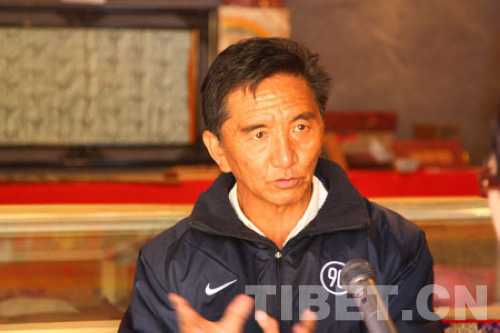
Jampa Tsondre, board chairman of Lhasa Jatson Welfare Handicraft Co., Ltd. is also headmaster of Lhasa Jatson Welfare Special School, file photo from China Tibet Online.
Jampa Tsondre, board chairman of Lhasa Jatson Welfare Handicraft Co., Ltd. is also headmaster of Lhasa Jatson Welfare Special School. Known as father of nearly 200 disabled children, he is responsible for their living.
In 1986, Jampa Tsondre took over Lhasa Chengguan No.1 Shoe Factory as factory manager. At that time, the factory was about to go bankruptcy, for its products lacked in variety, its sales was below 50,000 yuan and its interest below 10,000 yuan.
With the implementation of the reform and opening-up policy, Jampa Tsondre led all staff workers to carry out bold reform and continuously develop new products.
Its products was increased to over 40 kinds and sold both at home and abroad, which brought in an annual profit of over 200,000 yuan with its fixed assets amounting to nearly 10 million yuan.
At that time, many disabled children couldn't afford to go to school and some disabled youths couldn't make a living. Jampa Tsondre was anxious about this situation.
Thanks to the support of the Chengguan officials, the shoe factory was renamed as Lhasa Jatson Welfare Handicraft Co., Ltd. through registration at the department concerned.
Jampa Tsondre employed more than 20 disabled youths to learn living skills in the factory. The young men learnt not only various ethnic handicraft skills, such as painting, carving and shoe making, but also knowledge in various subjects.
After mastering skills, most of the disabled youths chose to impart craftsmanship to their hometown fellows except a few who continue to work at the factory. This has become a promising path to a better living for disabled youths.
In 1993, Jampa Tsondre called on all the staff to raise over 400,000 yuan, and established the first welfare special school on the Tibet Plateau.
Apart from taking regular courses, students also learn various craftsmanship at school such as Tibetan painting, costume design, Thangka and wood-carving, through which they have become more independent.
